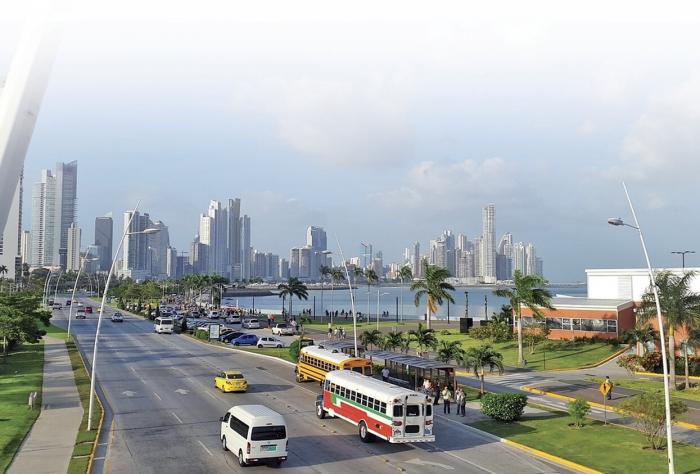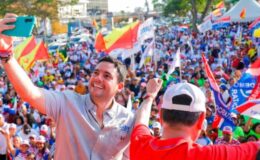The asset forfeiture law in Panama will not cover crimes against the public administration, if the Executive wants the Legislative to approve it this pre-election year.
In a recent Tink Tank Trinka forum, three experts linked to this debate explained what is going on within the technical discussion tables and the advances to try to move a document that can already be considered seriously mutilated in its original proposal to the first debate.
They say that politics is the art of the possible. It would also be opacity.
This regulation is a legal tool used to confiscate assets obtained through illegal activities, such as drug trafficking, corruption and organized crime in most countries where it exists.
This law allows the state to seize the assets of criminals, even before a conviction has been handed down.
María Soledad Porcel, for Transparency International; Jonathan Riggs, secretary general of the Ministry of Security, and the former minister of that portfolio, Alexis Betancourt, shared their experience in this phase of observations and proposals for changes to the bill that has been awaiting debate and approval since 2021.
It is true that a “basket of crimes” was established to be included in the law – except those of corruption or against the administration – but those who will make the decision are the deputies when the law debates begin, confirmed Riggs.
Porcel revealed that this discussion is reached when “the growth of (criminal) gangs has been very strong and sustained” and one objective is to strip them of ill-gotten goods so that they do not continue to recruit gang members with it.
A parenthesis, during the government of President Juan Carlos Varela (2014-2019) in a meeting with journalists a few months into his term, he said that the problem of combating the growth of gangs at the service of drug trafficking was to get out of the area of risk to young people, competing with recruiters who offered triple what they were given by local leaders, and for this reason they tried “safe neighborhoods.”
The first asset forfeiture bill was proposed by former attorney Ana Belfon (2014), the second by her colleague Kenia Porcell (2015), and the current one, presented in 2021 by the Panamanian Minister of Security, Juan Pino, maintains “in essence ” the same articles developed in 2011, recalled the former minister Betancourt.
But Porcel went further and said that “a gang seized part of the administration” of the Cerro Patacón sanitary landfill and “pressured many people who worked in these places to be almost like slaves” and also happened in Capira, La Chorrera and “the recyclers” made them aware of the risk they were facing.
“This was one of the problems of Cerro Patacón,” said the lawyer, although she did not specify dates of this situation.
The project has “many detractors” due to “the retroactivity of the law, and 80% of the lawyers were against it to prevent it from being out of public order and social good” in order to eliminate “its retroactive effect.”
For this reason, it is proposed that it be applicable “up to 20 years before” the acquisition of the ill-gotten property, to guarantee the retroactivity of the law in accordance with the constitutional provisions of Panama. “That’s a pretty big step,” he said.
As a civil society, it was postulated that this law should not be assigned to the criminal sphere, but to the civil sphere, because the extinction of domain for other reasons is already contemplated there and the judges of these instances “have more knowledge” in this matter.
Another parenthesis, they should review the behavior of civilian judges in the interior of the country, where there are numerous cases of dispossession of property and land where, at least, they turn a “blind eye” and allow these abuses. There is already one who, since he cannot justify his assets in relation to his income, took to his heels.
But there is also the possibility, after training, that a hybrid instance (civil-criminal) of judges and prosecutors for asset forfeiture be created, with all its appeal levels and other resources offered by Panamanian jurisprudence.
Multidisciplinary work was done to eliminate any stink of unconstitutionality in the project, as well as to establish maintenance guarantees for tangible assets to prevent their deterioration “eliminating any risk of being used for political persecution,” Porcel said.
The experience of Colombia, Mexico, Ecuador, Guatemala, Honduras, among other neighbors, has helped to correct the articles of the Panamanian project.
Trafficking in persons, trafficking in minors, corruption of minors, crimes against humanity, are part of the basket of crimes that is proposed to the deputies, and “all are linked to corruption,” specified the lawyer.
Betancourt defends the “direct fight against crime” and is a believer in the law of asset forfeiture with a “sui generis” status and defends that the subject be discussed openly with all those who oppose it in order to “extinguish” doubts.
“Project 625 is a super law,” said the lawyer and former police officer, which holds the State responsible for “not affecting people’s rights,” such as those of inheritance, non-imputability, and human dignity.
He argued that to get out of the FATF “grey list” the asset forfeiture law is not required because it is not part of the current evaluation that is made to Panama.
Panamanian Rigg, criminologist expert and secretary general of the Ministry of Public Security, police officer graduated in Chile, acknowledged that he was criticized for stating that “criminal law failed” in the persecution of the financial muscle of organized crime in Panama because people do not give up to live off crime.
He cited that Colombia “is the pioneer” in the application of domain forfeiture and has managed to recover “around $4,000 million” of illicit assets to compensate society for the harm caused.
Although he recognized that this law “will not end the crime,” it will be a powerful tool in criminal prosecution, because even the investigator who does not prove such an offense will be punished.
All goods “of legal origin and legal destination” are protected by the Constitution, Rigg reiterated, but “the illegal” cannot have constitutional protection if it is shown in the investigation that “it lacks legitimacy.”
The terms for the investigation are proposed from six months to one year, the expert confirmed.
And the healthy debate will continue, now in the field of deputies, when the commission forwards the results of the consultations, and it will undoubtedly be a litmus test.
In Latin America, the domain forfeiture law has been implemented in several countries. Here are some examples:
In Colombia, the law has been used to confiscate property and assets illegally acquired by drug trafficking groups. For example, in 2018 Colombian authorities seized a 1,500-hectare property belonging to an illegal armed group known as the Clan del Golfo.
In Mexico, the law has been used to seize property and assets illegally acquired by criminal organizations and corrupt politicians. For example, in 2019, Mexican authorities seized a luxury mansion belonging to a former governor of the state of Veracruz, accused of corruption, and seized various assets related to the leader of the Sinaloa cartel, Joaquín “El Chapo” Guzmán, including a plane. , a yacht and several properties. But the Constitutional Chamber left the law inoperative, Rigg said.
In Brazil, the law has been used to seize property and assets illegally acquired by criminal organizations. For example, in 2019, Brazilian authorities seized property valued at $44 million belonging to a businessman accused of corruption, and Brazilian authorities seized various assets from former Rio de Janeiro state governor Sérgio Cabral, including luxury apartments, a yacht, and a helicopter.
In Peru, the law has been used to confiscate property and assets illegally acquired by drug traffickers and criminal organizations. For example, in 2016, Peruvian authorities seized a $20 million luxury hotel belonging to a drug trafficking group. In 2018, Peruvian authorities seized various assets from Colombian drug trafficker Gerson Aldair Gálvez Calle, known as “Caracol,” including a mansion in Lima and several properties in the department of Huánuco.
In El Salvador, the law establishes a judicial process for the seizure of assets and their subsequent administration by the State. Assets can be sold or auctioned to earn proceeds that are used for crime prevention and victim reparation programs.
In 2013, the Attorney General’s Office seized six real estate and a luxury vehicle belonging to the criminal organization “Los Perrones”, dedicated to drug and arms trafficking. The seized assets were valued at more than $3 million.
In 2018, authorities seized various assets from a businessman accused of money laundering and tax evasion, including a luxurious apartment in San Salvador and a 85-hectare property on the Pacific coast. The assets were valued at more than $2 million.
In Guatemala, assets can be seized at any time, even before a judicial process is initiated, if there are indications of their illegal origin. The seized assets are managed by the National Secretariat for Assets in Domain Forfeiture Administration (Senabed) and can be sold or auctioned to obtain resources for crime prevention programs.
In 2016, the authorities seized a farm of more than 2,400 hectares in the Petén department, owned by a gang dedicated to drug trafficking and illegal logging. The estate was valued at more than $20 million.
In 2019, authorities seized various assets from a former communications minister accused of corruption, including a house in an exclusive area of Guatemala City and a luxurious office in a commercial building. The assets were valued at more than $800,000.
To elaborate more, I recommend the interview of my colleague Adelita Coriat on the subject in La Estrella de Panamá at the following link: https://www.laestrella.com.pa/nacional/poligrafo/221009/andres-ormanza-extincion-dominio -It constitutes
In summary, the asset forfeiture law in Panama is an important legal tool to combat organized crime and recover illegally obtained assets. Will the deputies rise to the responsibility? They have the floor.




No Comments